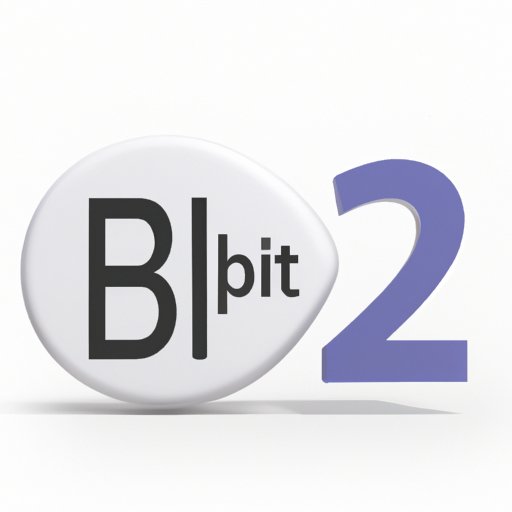
I. Introduction
Weight loss is a common struggle, and many people are looking for solutions to help them shed unwanted pounds. One potential solution that’s gaining popularity is B12, a vitamin that plays an important role in overall health and has been linked to weight loss benefits. This article aims to explore how B12 can support weight loss efforts and provide a comprehensive guide to using it effectively.
II. The Importance of B12 in Weight Loss: A Beginner’s Guide
Before diving in, it’s important to understand what B12 is and why it’s necessary for good health. B12 is a water-soluble vitamin that helps keep the body’s nerve and blood cells healthy and aids in the production of DNA, the genetic material found in all cells. It’s typically found in animal-based foods like meat, fish, and dairy products, making it a challenge for vegans and vegetarians to get enough through their diet alone.
B12 also plays a crucial role in energy production, helping to convert the food we eat into energy that our cells can use. This is related to its potential benefits for weight loss, as having adequate energy levels is important for staying active and burning calories.
III. The Science Behind B12 and Weight Loss: What You Need to Know
There have been several studies exploring the link between B12 and weight loss, with mixed results. Some research suggests that B12 may help suppress appetite, leading to fewer calories consumed overall. Other studies have shown a connection between B12 deficiency and weight gain, which could be due to the role that B12 plays in metabolism.
B12 is essential for a healthy metabolism, and low levels can lead to a slower metabolism, making weight loss more challenging. When we have enough B12, our metabolism functions optimally, allowing us to burn calories more effectively.
IV. B12 Injections for Weight Loss: How Effective Are They?
B12 injections are a popular method of getting a high dose of B12, especially for those with a deficiency. These injections go directly into the muscle, offering a quick and powerful boost of the vitamin. However, the evidence on their effectiveness for weight loss is limited.
While some studies suggest that B12 injections can promote weight loss, the results have been mixed, and more research is needed to understand their true impact. It’s important to note that B12 injections can also have side effects, such as pain, swelling, and redness at the injection site.
V. B12-Rich Foods for Weight Loss: An Introduction to Some of the Best Sources
Getting enough B12 through a healthy diet can be challenging for vegans and vegetarians, but there are still plenty of options available. Some of the best sources of B12 include:
- Meat and poultry
- Fish and shellfish
- Dairy products
- Eggs
- Fortified breakfast cereals and nutritional yeast
Incorporating these foods into a healthy diet can help ensure that you’re getting enough B12 to support your weight loss goals.
VI. How B12 Supports Metabolism for Weight Loss: A Closer Look
To fully understand the connection between B12 and weight loss, it’s important to explore how B12 supports metabolism. One way B12 does this is through its role in energy production, as mentioned earlier. When we have enough B12, our cells can efficiently convert the food we eat into energy, allowing us to maintain an active lifestyle and burn calories more effectively.
B12 also supports fat metabolism, another key factor in weight loss. When we have enough B12, our body can process and break down fat more efficiently, leading to greater fat loss over time.
VII. B12 Supplements and Weight Loss: Tips for Proper Dosage and Usage
If you’re struggling to get enough B12 through diet alone, B12 supplements can be a useful tool. There are several types of B12 supplements available, including pills, gummies, and liquid forms. It’s important to choose a high-quality supplement and follow the recommended dosage guidelines to ensure safety and effectiveness.
Most adults need about 2.4 mcg of B12 per day, but some may require higher doses, especially if they have a deficiency. It’s important to speak with a healthcare professional to determine the best dosage for your individual needs.
VIII. The Link Between B12 Deficiency and Weight Gain: An Exploration
B12 deficiency is more common than many people realize, especially among vegans and vegetarians. When we don’t get enough B12, our metabolism can slow down, making it more challenging to lose weight. B12 deficiency can also lead to other health issues, like anemia and nerve damage.
Fortunately, B12 supplements and injections can help address deficiency and support healthy weight management. If you suspect you may have a B12 deficiency, it’s important to speak with a healthcare professional to get tested and develop a plan for supplementation.
IX. Conclusion
Incorporating B12 into your weight loss strategy can be a useful tool, but it’s important to understand the science behind it and use it effectively. B12 supports metabolism and energy production, making it essential for overall health and weight loss. Whether you choose to get your B12 through diet, supplements, or injections, it’s important to work with a healthcare professional to determine the best approach for your individual needs.
Don’t let a B12 deficiency hold you back from reaching your weight loss goals. With the right tools and support, you can accomplish them with ease.





